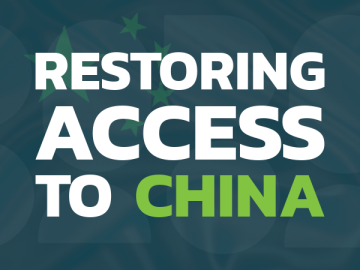

Now is the time for strong leadership, common-sense policies and a commitment from everyone with a stake in Canada’s supply chains.
Mar 18, 2021

Build Back Better. It’s a catchy slogan – and a good idea. Throughout the pandemic, the Canadian agriculture and food industry has shown it is more than up to the task. But without the right practices, policies and infrastructure in place, it is becoming increasingly clear Canada will not be able to fully realize its potential to strengthen our economy through agri-trade in a post COVID-19 world.
There is no doubt that, to most Canadians, 2021 looks a lot different than 2020. At this time last year, COVID-19 was just making its way to our shores. Today, the country is looking ahead to mass vaccinations and the promise of a semblance of normalcy. However, from a transportation perspective, it’s “déjà vu all over again”. From labour disruptions, to weather delays, derailments, and massive amounts of congestion in the containerized supply chain, not a lot has changed. And that has left our industry with a serious problem. The recent announcements from Canada's rail carriers on moving record volumes of grain are something to celebrate, but there's more to being a global leader and outcompeting other origins than volume.
For Canadian agri-food products to command the premiums they deserve, the timeliness of rail car spotting on the prairies each week must improve. We are now more than thirty weeks into the grain calendar year. Canada’s railways have fallen short by 1300 or more orders on a weekly basis for twenty-six of those weeks, rising to more than 2000 orders per week on five separate occasions. Simply put, timing is everything. When rail cars aren’t spotted to match orders, there’s a ripple effect across the entire supply chain. Uncertainty at the point of origin forces every player downstream to adjust plans, leading to delays and congestion at the port, not to mention demurrage and container detention fees. Protracted delays lead to contract penalties and, over time, the very real risk of cancelled contracts. Building Back Better means we don't just learn how to better manage through these conditions, it means we're committed to eliminating them; delivering more grain while building a brand promise of consistent and reliable delivery.
When grain does make it through to the Pacific Gateway, it arrives at a port in need of a governance overhaul. A recent campaign led by the Western Grain Elevator Association is drawing attention to the need to modernize port governance so the port better represents the commodities it serves. The vast majority of products shipped through the Port of Vancouver (agricultural and beyond) originate from the four western provinces, who lack adequate representation. It cannot be overstated how important the Pacific Gateway is to the Western Canadian economy, and specifically for agriculture; grain alone accounts for 25% of all bulk shipments through the Port of Vancouver. Whether it’s the process on Board of Director nominations, the potential conflicts of interest that inevitably come up when ports act as both developers and regulators, or adequate recourse to appeal decisions reflecting monopoly behavior, the Government of Canada must provide solutions that update governance structures to promote investment and be accountable to the industries that drive the economy.
As seen in previous years, labour issues continue to produce uncertainty - most notably with strike action possible at the Port of Montreal this March. Exporters are already being asked by customers in high-value markets to avoid shipping through the port, not wanting a repeat of disruption from the summer of 2020. Having to make these alternative arrangements places unnecessary strain on Canada’s logistics system and deals a blow to customer confidence. And at a time when the world’s container supply is severely constrained, Canadian supply chain stakeholders must do everything within their ability to demonstrate they can be counted on to optimize asset utilization. A labour disruption at the Port of Montreal will send the opposite message. Pulse Canada and like-minded groups across Canadian agriculture are calling for action to #StoptheStrike - finding a solution that helps parties reach an agreement before there’s another work stoppage must be seen as a priority.
While COVID-19 has presented unique challenges, the fact is that year on year, you can set your watch to issues interrupting the flow of grain and other commodities. What is clearer than ever is that a national plan to better anticipate and strategically address these inevitable issues is critical to Canada’s economic recovery. And this plan cannot focus on grain alone.
As a country we are incredibly reliant on a well functioning transportation network to move our goods and keep our economy performing. A network with trademark resiliency will deliver results for Canadians from all regions and all industries. That is why Pulse Canada is renewing its call for a national conversation on transportation – one that includes shippers from the agriculture, forestry, mining and chemicals sectors, as well as governments and other stakeholders.
For our part, we are ready and willing to Build Back Better. Now is the time for strong leadership, common-sense policies and a commitment from everyone with a stake in Canada’s supply chains to help make it possible.
Our bi-monthly newsletter provides growers with timely, quick reads on the latest industry news and Pulse Canada’s work around the world.
Pulse Canada is the national association of growers, traders and processors of Canadian pulses, also known as lentils, dry peas, beans and chickpeas. Pulses are an essential part of a healthy and sustainable diet. Pulses and pulse ingredients can help food manufacturers improve the nutritional and functional quality of food products.